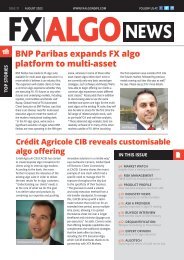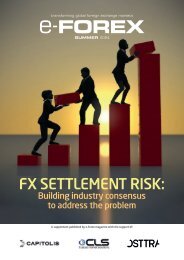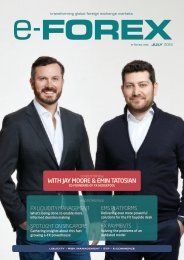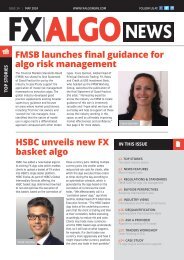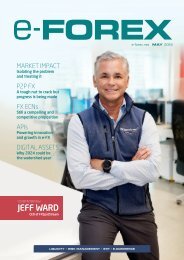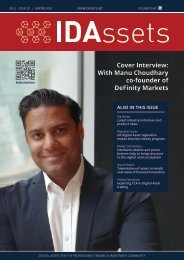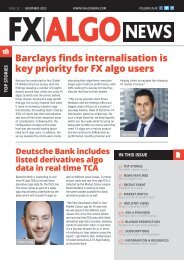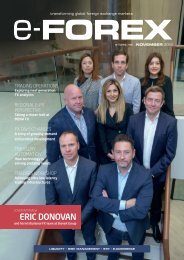Create successful ePaper yourself
Turn your PDF publications into a flip-book with our unique Google optimized e-Paper software.
TRADING OPERATIONS<br />
market risk back to the client. It is<br />
therefore crucial that analysis supports<br />
an auditable decision-making process<br />
to manage that risk.”<br />
Vivek Shankar<br />
Electronification has steadily increased<br />
in FX over the years, and has spawned<br />
new stakeholder needs. Proving<br />
commercial viability and increasing<br />
efficiency are two examples that have<br />
led to data analysis becoming a critical<br />
portion of the FX execution workflow.<br />
With more data at firms’ disposal<br />
than ever before TCA is playing an<br />
important role in helping them finetune<br />
their strategies. Guy Hopkins,<br />
CEO and Founder of FairXchange,<br />
believes this need underlies recent<br />
developments in execution analytics.<br />
“Regulatory drivers such as MiFID II<br />
have certainly increased adoption of<br />
data analysis,” he says, “however there<br />
is a much deeper commercial need to<br />
understand the impact of technology<br />
on the execution process.”<br />
Whilst Paul Lambert, Chief Executive<br />
Officer, New Change FX, adds that<br />
the shift towards algo execution has<br />
also had an effect. “The pandemic<br />
was key in driving adoption as traders<br />
were unable to use ‘old’ approaches<br />
to execution,” he says. “The realisation<br />
that passing an algo order is effectively<br />
the same as passing an ‘at best’ order<br />
to a bank has simultaneously driven<br />
the realisation that analysis is vital<br />
to ensure best execution. The risk for<br />
buyside traders that they might be<br />
making poor execution choices now<br />
poses a direct threat to the trader’s<br />
job. The effect of algos is to transfer<br />
PREPPING FOR DATA ANALYSIS<br />
Given the twin needs of justifying<br />
trade decisions and demonstrating<br />
their value to firms, data quality is<br />
playing a key role. Lambert lists a<br />
few different datasets traders look<br />
at from a high level. “Traders need<br />
to understand all aspects of the<br />
behaviour of their LPs,” he says. “The<br />
historical approach of simply adding<br />
LPs via an EMS is no longer adequate<br />
because each LP and their effect on<br />
the pool needs to be understood.”<br />
“Similarly, algo execution details like<br />
LP prioritisation and selection, reject<br />
rates, market impact, etc, need to<br />
be understood at a granular level<br />
rather than on a generalised, posttrade<br />
basis,” he continues. “The<br />
most important aspect remains<br />
the recording of a decision-making<br />
process that justifies execution<br />
methodology using real-time data.<br />
Static TCA is of little use in that<br />
process.”<br />
Meanwhile, Oleg Shevelenko, FX<br />
Product Manager, Bloomberg, echoes<br />
Lambert’s point about algos breeding<br />
new data analysis needs. “Automation<br />
and algorithmic trading require<br />
participants to have a much deeper<br />
understanding of their execution<br />
performance and how it can be<br />
incorporated into execution strategies<br />
that realise the most benefit,” he<br />
says. “Unbiased data is fundamental<br />
to the objective evaluation of trading<br />
performance,” he continues. “Liquidity<br />
providers are turning to third-party<br />
independent data providers to help<br />
them demonstrate the quality of their<br />
execution algorithms to their clients,<br />
while clients are also looking for<br />
independent data to benchmark their<br />
execution decisions and showcase<br />
their value to investors.”<br />
NOVEMBER 20<strong>23</strong> e-FOREX 21



